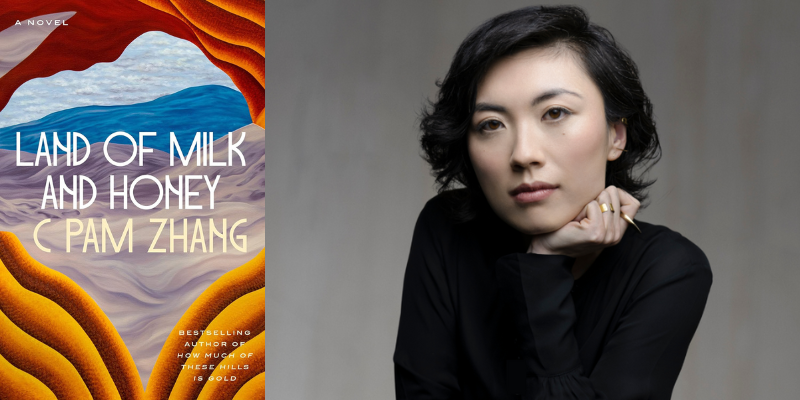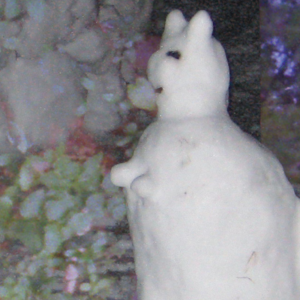C Pam Zhang on Food, Wealth, and Pressure
In Conversation with Maris Kreizman on The Maris Review Podcast
This week on The Maris Review, C Pam Zhang joins Maris Kreizman to discuss Land of Milk and Honey, out now from Riverhead.
Subscribe and download the episode, wherever you get your podcasts.
*
from the episode:
Maris Kriezman: You have written such a sensual novel, starting with all of the descriptions of food. I’m wondering if you could tell me about writing a novel in which food is a metaphor for many things, but also food is food.
C Pam Zhang: Yeah, I love that question because food occupies this very interesting place in our lives where one, it is a necessity in order to live, but two, increasingly, it is also seen as an art form. And I do believe it is an art form, and I think that seeing the roles that food occupies on different tables and different contexts tells us a whole lot about the values of the people who are in that situation. It’s funny because, yes, the food absolutely acts as a metaphor in this novel, especially as this chef goes to cook for this colony of the uber wealthy who have values that she doesn’t necessarily align with. But at the same time, it also is something that makes us animals, you know, and I loved playing with that duality.
MK: Absolutely. I was mostly reminded of The Wizard of Oz, when you take the chef from a place of black and white and gray, and then suddenly she’s in technicolor.
CPZ: Wait, I just have to stop and say what an incredible reference that is. There was an early version of this book where I had dreams of having images that are dividers between the sections in the novel, and I had dreams of having them go from black and white to color. Obviously, that wasn’t possible with printing.
MK: So maybe give us a little background on the grayness, where your senses are dulled because of something that seemingly could happen at any moment to us in real life.
CPZ: Yeah, so, in the world of the novel, there is a smog of unknown origins that has cloaked the Earth and killed off the majority of food crops. So, most people are eating this soy, mung, protein, algal, flour replacement, and only the very, very, very wealthy have sunlight and fresh food. So that’s what happens in the book and for me, it came from a place of similar bleakness.
I wrote this novel at the very beginning of 2021. We were in deep pandemic, and it was a time when I felt fundamentally disconnected from my body. There were so many big issues to be putting our energy into, you know, the political situation, pandemic relief, the murder of George Floyd. And I became impatient with the fact of having a body that had all these desires and wants. They felt frivolous, right?
And I really beat myself up for wanting to go out and eat a nice meal with a friend, wanting to go to a bar, wanting to travel. So the bleakness of the world was compounded by this enforced bleakness and stringency that I was having myself live under, and so the culinary background of the novel was really born out of one of my first meals out again after we were vaccinated. And eating with people I cared about and seeing how the food really brought them back to themselves. It was this light bulb moment that made me think, like, if I want that for the people I care about, don’t I want that for myself? Don’t I, in fact, want that for most everybody?
MK: Absolutely. When you describe the soy mung, it kind of reminded me of Soylent. Not the “it’s people.” But the kind of meal that a tech bro, for the most part, would have instead of running out to grab an actual bite to eat for lunch.
CPZ: Yeah, I have tried Soylent back in my days of living amongst tech bros. This world in which, like, if your ultimate goal is kind of efficiency, and you see your body and your brain as a machine, where does that lead you? Why do we want to become machines?
MK: Yeah, and even some further background into the unnamed chef’s circumstances before the smog descended sounds a little familiar to what I’m hearing today: that there’s a generation of people who were promised many different things for their futures, and then that has not come to bear out.
CPZ: Yeah, so the chef is American, and she starts out the book stranded in Europe because the massive famine and crop failures in America have caused the country to close its borders and to actually begin to question, again, who is American. Who is allowed back in? There’s a whole list. And so there’s a question at the heart of the novel about what does it mean to have faith in a nation, in a constructed identity, in any kind of identity, which certainly is a thing I think that many people living right now are contending with.
MK: Absolutely. The way you describe the super wealthy is also familiar in many ways, that there seems to be now more than ever, now more than in the Gilded Age, this desire by the ultra wealthy to hoard: to hoard resources, to hoard money, to really make it kind of a zero sum game.
CPZ: Yeah, and I think what’s also happening today is there’s this fascinating obsession that the non uber wealthy, the majority of us, actually have for these tactics, right? I think of things like Elon Musk’s SpaceX venture, absolutely a capitalist venture. This random fantasy of this man who has too much money to throw around, and people talk about it as if it is scientific innovation that’s going to bring this all forward. When literally he’s like, I’m gonna sell tickets to go to Mars if I go to Mars.
But there’s, there’s something that’s in the air right now where, I don’t know, there’s a kind of obsession, with the uber wealthy, and maybe it’s just… obsession with the sort of scope of their imaginations about the future. You know what I mean?
MK: Yeah. It’s funny to hear both Elon Musk and Jeff Bezos talk about space exploration as if what they’re doing is noble is an exploration rather than a capitalist venture at heart.
CPZ: Yeah, and I think the public goes along with it because we’re just sunk so deep into this culture of capitalism and efficiency said in the same sentence as humanist progress, that it can be hard to disentangle.
MK: Absolutely. Especially when I feel like during the pandemic we saw that the richest people in the world got even richer, and of course the people who needed to work for their daily paycheck, struggled more than ever. And I guess it’s probably hard not to envy, at least.
CPZ: You know, another interesting trend that I noticed during the pandemic was in my life, and this is now anecdotal, but a lot of the people who were not super wealthy and who had a lot of responsibilities to juggle were also the people who kept pushing themselves to give more, to give back to their community, to check in on everyone, to kind of just worry on an individual level about the fate of the world: the nation, the elections, the planet, the environment. That was a fascinating contrast that also kind of drew me into this book because I, as much as those big causes are important, I also wanted my friends and loved ones to have space for individual pleasure and for them to think of it as not only good for themselves but in a weird way as good for the communities in which they were a part of. I was so tired of seeing my friends burn out, because after you burn out how can you give back to anybody else?
*
Recommended Reading:
The Gastronomical Me by MFK Fisher • All This Could Be Different by Sarah Thankam Matthews • Sweetbitter by Stephanie Danler
__________________________________
C Pam Zhang is the author of How Much of These Hills Is Gold, winner of a whole bunch of prizes and one of Barack Obama’s favorite books of the year. She is a National Book Foundation 5 Under 35 honoree and a New York Public Library Cullman Fellow. Her new novel is called Land of Milk and Honey.




















